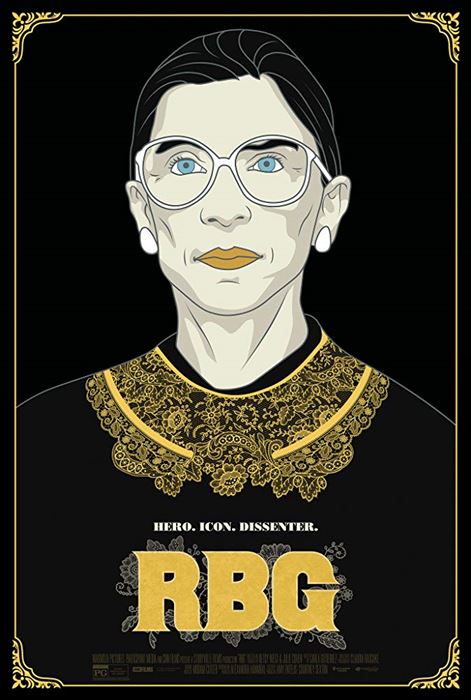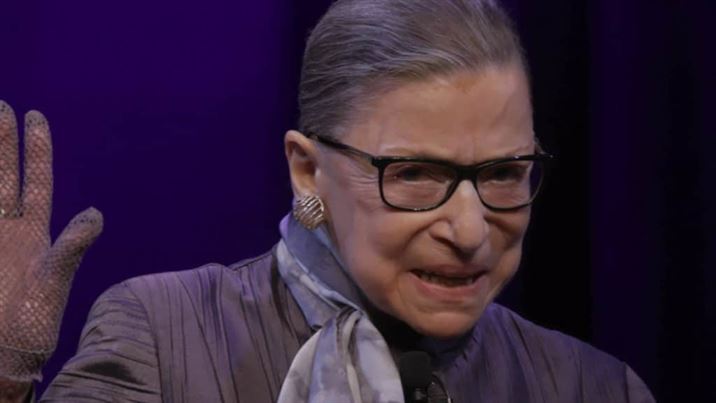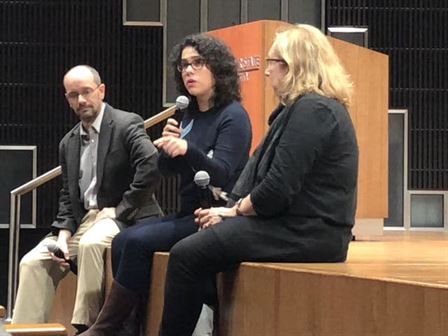Carla Gutierrez, the editor of the acclaimed documentary “RBG” came to Montclair State University to not only screen the much-hyped film but to lead a discussion about the editing process.
The Film Institute at Montclair State’s Films and Filmmakers Series presented the documentary, profiling Ruth Bader Ginsburg and her fascinating trajectory as a feminist icon that changed the lives of American women forever.
Montclair State professor Roberta Friedman hosted the event during her weekly film forum course in the School of Communication and Media. Gutierrez joined the conversation alongside Ian Drake, a Montclair State professor of political science and law, who provided legal and historical frameworks for consideration.

Carla Gutierrez, the editor of the documentary “RBG,” came to Montclair State to screen the film and talk about the editing process. Photo courtesy of Magnolia Pictures
The documentary combines different layers of Ginsburg’s life and creates a more rounded image of the unlikely hero. Her story is full of obstacles, but through everything she remained focused on attaining equality for all, ultimately becoming a Supreme Court Justice where she remains a highly controversial figure.
Junior communication and media arts major Imani Hamilton attended the screening and emphasized the importance of a person who is willing to dedicate their life to fighting for justice.
“I think she’s a real icon for women’s empowerment, and the film was amazing at demonstrating the effect she had on the movement,” Hamilton said. “She shows us what the United States should stand for – that everyone should be treated equally. I feel like she really tries her best to make sure that happens.”
Ginsburg grew up during a time when women’s roles were tied to the household. She was often met with judgement for her choice to pursue higher education and was turned away by employers who refused to hire women.
She fought against gender discrimination throughout college and in her career by continuously proving herself to be a qualified and deserving candidate based on her abilities.
Ultimately, Ginsburg’s experiences of pervasive discriminatory practices against women motivated her to fight for cases through the Supreme Court. If a law was not already supporting full and unrestricted equality, she was determined to find a way to change it.
Ginsburg worked on cases that improved quality of life for all American citizens. Fair pay across genders, equal jury representation in a court of law and survivor benefits for widows are just a few of the many issues she has tackled.
Gutierrez explained that Ginsburg was a different kind of feminist and adopted her own way of creating change.
“She wasn’t going to the marches and letting her hair down in the ’70s,” Gutierrez said. “It’s a different image of the women’s movement than what you see in other films.”
One of the most admirable qualities that Ginsburg possesses, however, is her ability to engage with others regardless of their political beliefs. This sentiment was shared by Drake.
“It was really important that [the film] included her friendship with [Antonin] Scalia, which is reputed to be her closest friend on the court,” Drake said. “Not withstanding the fact that he’s a conservative, they were really able to find things that they have in common.”

U.S. Supreme Court Justice Ruth Bader Ginsburg appears in “RBG,” directed by Betsy West and Julie Cohen. Photo courtesy of Magnolia Pictures
The film was especially impressive for its ability to weave together the stories of complicated court cases in an intimate and approachable way. Many of the plaintiffs Ginsburg represented were interviewed for the documentary and told their own story of hardship that she helped them to overcome.
Gutierrez shared that a majority of the crew involved in production was female, and she believes that this improved the ability to tell Ginsburg’s story.
“All the main crew was female. I felt really close to the work that women have done in the past to get us where we are today,” Gutierrez said. “In the edit, we made decisions specifically with the idea that we wanted to help new generations connect to this history, too. One of the ways we did that was by showing the faces of those women, all the women that have come before us.”
Students that attended the event unanimously declared their love and admiration for the documentary as well as its endearing subject.
Sophomore communication and media arts major Louis Fernandes was impressed by Ginsberg’s legacy as a force for change.
“She is pretty badass in how she lives her life,” Fernandes said. “I thought it was really cool to have this new insight and get a closer look.”
Junior English major Anthony Streppone enjoyed learning more about Ginsburg’s influence in American history.
“I didn’t realize how much she really did for women’s rights back in the ’70s,” Streppone said. “It was kind of eye-opening.”
In recent years, Ginsburg’s accomplishments have caused her to become a kind of internet celebrity. Online bloggers call her “Notorious RBG” and “The Great Dissenter.” She has amassed quite a following of young women that aspire to pursue change in her honor.
Ginsburg’s success is powerful because it comes down to hard work, determination and a tireless effort to chase your dreams. “RBG” shows us that there are so many ways we can create positive change in our world, even if it is one small step at a time.



